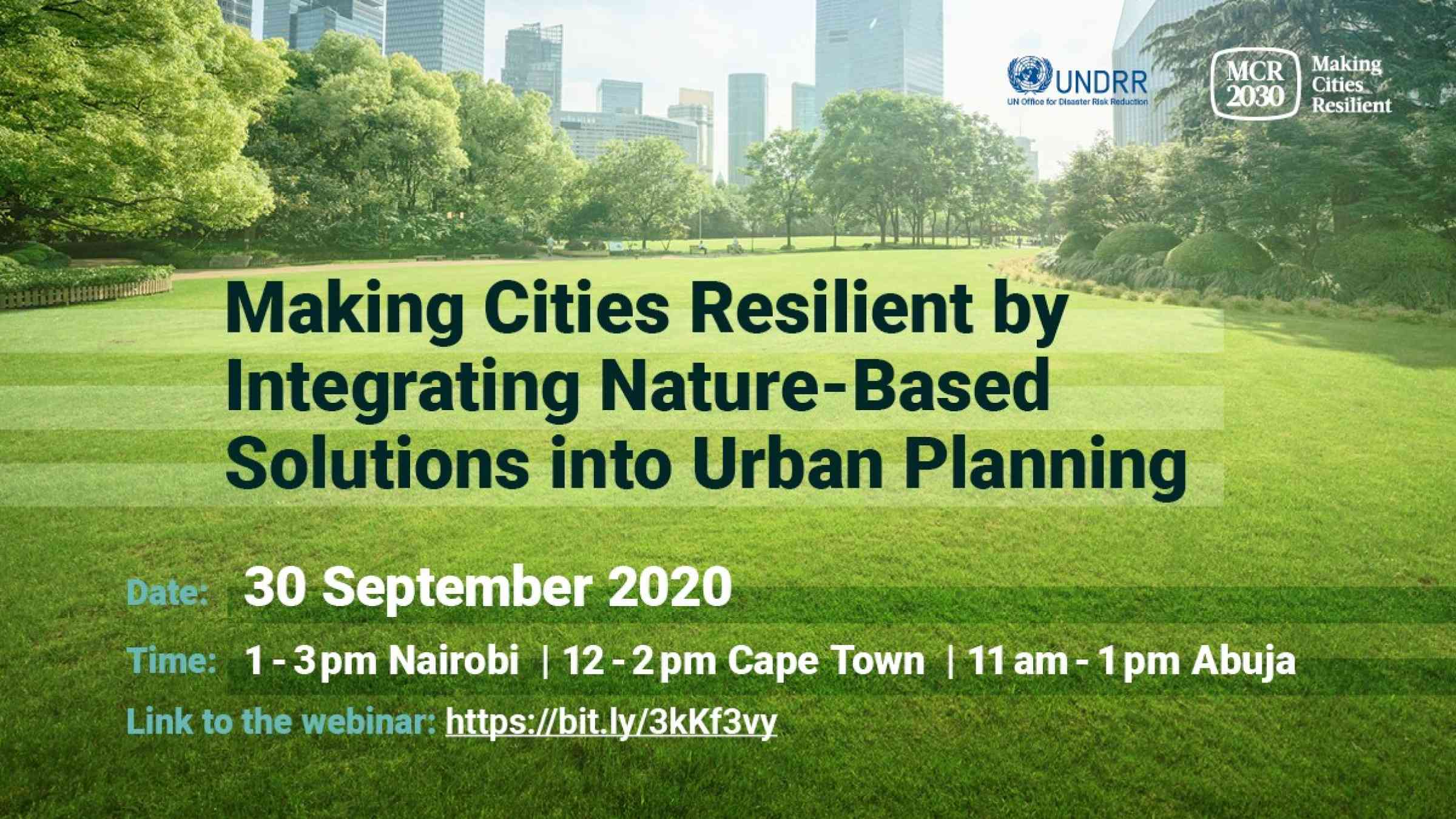Making Cities Resilient by Integrating Nature-Based Solutions into Urban Planning in Africa

Date: 30 September 2020
Time: 1 – 3 pm Nairobi|12 – 2pm Cape Town|11am - 1pm Abuja
Link to the webinar: https://undrr.zoom.us/webinar/register/WN_zksIltrOSzmV6rwxC29ICg
Language: English, French and Portuguese available
More than one half of the world’s population lives in urban areas, most of which are predisposed to natural and human-made hazards. Reports indicate that the fastest growing cities in Africa are among the most susceptible to the threat of climate change over the next 30 years. Exposure to risk, especially by the urban poor, has increased with rapid population growth and encroachment on wetlands, floodplains, riverbanks, steep slopes, and other hazard-prone areas. Climate change and rapid urbanization exacerbate many of the risks in African cities. With the frequency and intensity of disasters increasing, the urban poor in the Global South are at most significant threat. The implication of this reality means that there is a need for countries to focus their collective energies to create a safer world for urban dwellers and develop a series of innovative approaches to meet this challenge.
Urbanization that takes place without risk-sensitive urban planning increases cities vulnerability to climate change and natural and human-made hazards. An essential component of building resilience in cities is investing in nature-based solutions through restoring and preserving the existing, or putting in place new ecosystem services that may protect cities from the impact of climate change or extreme weather events such as heatwaves and floods.
Through the Making Cities Resilient Campaign, the United Nations Office for Disaster Risk Reduction (UNDRR) and its partners have been supporting local governments in defining coherent risk reduction policies and practices that include nature-based solutions into urban planning. Ecosystem-based disaster risk reduction (Eco-DRR) is the sustainable management, nurturing of natural buffers and restoration of ecosystems to provide services that reduce disaster risk by mitigating hazards and by increasing livelihood resilience. To enhance ecosystems’ protective functions in this time of increased urbanization and climate crisis, integrating the critical ecosystem services into the city’s policies and planning becomes ever more urgent.
Efforts to build resilience in cities can benefit from integrating disaster risk reduction and climate change adaptation with existing efforts in disaster risk management, sustainable development, and other similar planning processes. The current and future challenges of mainstreaming Climate Change Adaptation (CCA) and Disaster Risk Reduction (DRR) can benefit significantly from strategic collaborations and experience sharing. This webinar brings together diverse perspectives about climate change and disaster resilience in the context of cities.
Objectives:
- Create an understanding of the role of cities in climate action in Africa
- Recommend approaches and best practices to nature-based solutions for cities and partners in Africa
- Create a linkage with ongoing partner initiatives
- Foster strategic alliances for making cities resilient in Africa
|
Provisional agenda |
|
|
10 minutes |
Welcome Remarks Mr Amjad Abbashar, Regional Director, UNDRR Regional Office for Africa |
|
12 minutes |
Mr Cheikh Kane, Climate Resilience Policy Advisor, Red Cross Red Crescent Climate Centre Strengthening legislative and policy frameworks for disaster risk management and climate change adaptation |
|
12 minutes |
Ms Elizabeth Mwangi, Regional Technical Advisor, C40 Cities Cities as a solution to climate change |
|
12 minutes |
Ms Tarryn Quayle, Professional Officer, ICLEI Africa Promoting demand-driven, inclusive, and multi-stakeholder approaches for sustainable urban development |
|
12 minutes |
Mr Isaac Mugumbule, Directorate of Physical Planning, Kampala Capital City Authority Experience in greening Kampala City; natural assets management |
|
12 minutes |
Mr Manuel Araújo, Mayor, City of Quelimane, Mozambique Coastal resilience; mainstreaming nature into urban planning |
|
12 minutes |
Mr Tabi Joda, Executive Director, GreenAid International Integrated nature-based solutions, linking communities to sustainable resilience actions |
|
25 minutes |
Q and A |
|
10 minutes |
Wrap Up and closing Moderator: Isabel Njihia, UNDRR Regional Office for Africa |